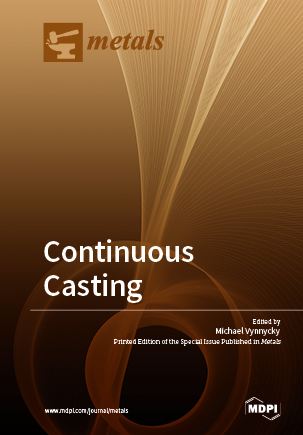Continuous Casting

Download Url(s)
https://mdpi.com/books/pdfview/book/1458Author(s)
Vynnycky, Michael
Language
EnglishAbstract
Continuous casting is an industrial process whereby molten metal is solidified into a semi-finished billet, bloom, or slab for subsequent rolling in finishing mills; it is the most frequently used process to cast not only steel, but also aluminium and copper alloys. Since its widespread introduction for steel in the 1950s, it has evolved to achieve improved yield, quality, productivity and cost efficiency. It allows lower-cost production of metal sections with better quality, due to the inherently lower costs of continuous, standardized production of a product, as well as providing increased control over the process through automation. Nevertheless, challenges remain and new ones appear, as ways are sought to minimize casting defects and to cast alloys that could originally only be cast via other means. This Special Issue of the journal ""Metals"" consists of 14 research articles that cover many aspects of experimental work and theoretical modelling related to the ongoing development of continuous casting processes.
Keywords
inclusion motion; n/a; air mist spray cooling; empirical mode decomposition; electromagnetic field; solidification; final electromagnetic stirring; beam blank; liquid core reduction; tundish; thermomechanical coupling; flow behavior; steel tundish; austenite grain coarsening; pores; annular argon blowing; round bloom; mold; thin-slab cast direct-rolling; data stream; grain growth control; propagation; two-phase pinning; HTC; prediction; argon gas distribution; baffle; flow field; bubbles; heat transfer; inclusions; upper nozzle; swirling flow tundish; crystal; hybrid simulation model; roll gap value; inclusion entrapment; fluid flow; billet continuous casting; mechanism; heat flux; numerical simulation; secondary cooling; uneven secondary cooling; polycrystalline model; mold level; continuous casting; entrainment; slab continuous casting; magnetohydrodynamics; entrapment; asymptotic analysis; bulge deformation; slab mold; segmented roller; velocity; finite element analysis; multi-source information fusion; global optimization; support vector regression; variational mode decomposition; multiphase flow; molten steel flow; PIVISBN
9783039213221, 9783039213214Publisher website
www.mdpi.com/booksPublication date and place
2019Classification
Technology: general issues

